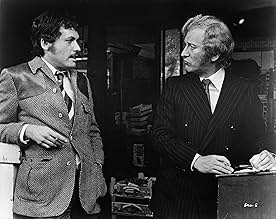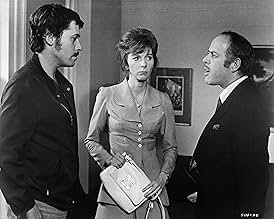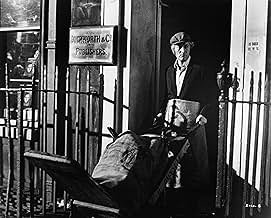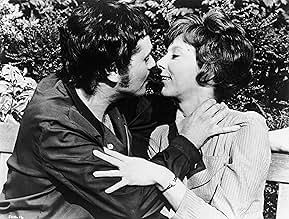PUNTUACIÓN EN IMDb
7,4/10
51 mil
TU PUNTUACIÓN
Un asesino en serie está estrangulando a mujeres con una corbata. La policía de Londres tiene un sospechoso, pero es el hombre equivocado.Un asesino en serie está estrangulando a mujeres con una corbata. La policía de Londres tiene un sospechoso, pero es el hombre equivocado.Un asesino en serie está estrangulando a mujeres con una corbata. La policía de Londres tiene un sospechoso, pero es el hombre equivocado.
- Premios
- 3 premios y 8 nominaciones en total
Argumento
¿Sabías que...?
- CuriosidadesAlfred Hitchcock originally planned to do his cameo as the body floating in the river. A dummy was even constructed to do the shot. The plans were changed and a female body, a victim of the Necktie Murderer, was used instead. Hitchcock instead became one of the members of the crowd who are listening to the speaker on the river bank. The dummy of Hitchcock was used in the typically humorous trailer hosted by Hitchcock.
- PifiasWhen examining the murder scene at the marriage bureau, a police officer brings the victim's handbag out to Inspector Oxford, who correctly holds it with a handkerchief to keep his fingerprints from contaminating the evidence. He then he sticks his ungloved hand inside and feels around, thus contaminating it with his own fingerprints.
- Citas
[last lines]
Chief Inspector Oxford: Mr. Rusk, you're not wearing your tie.
[Robert Rusk is speechless for a moment]
Robert Rusk: I...
[he drops the trunk that he has just dragged into the room]
- Créditos adicionalesThe Universal Pictures logo does not appear on this film.
- Versiones alternativasThe original UK cinema and initial 1989 CIC video releases were cut by 19 secs by the BBFC to remove shots of underwear removal and closeups of neck strangling from the murder scene. The cuts were restored in all later Universal video and DVD releases.
- ConexionesFeatured in The Dick Cavett Show: Alfred Hitchcock (1972)
Reseña destacada
After the poorly received Torn Curtain and Topaz, Hitchcock returned home to both the murder genre and to Covent Gardens in London to film Frenzy, a lurid tale of a serial killer and the man caught up as the prime suspect. The only feeling of new from the film comes from the use of nudity and a particular focus on the real killer, and yet it's still a solidly built thriller, the sort of thing that Hitchcock could seemingly do in his sleep.
There's a killer on the loose in London, and he has a trademark in that he rapes his female victims and then strangles them with a necktie. In the city is Dick, a former RAF pilot who's had a hard time of it since he left the service, going from job to job and recently divorced. He starts the movie by taking a drink from the pub where he works and immediately getting fired despite his protestations, and the support of his girlfriend Babs, that he was going to pay for it. Without a job, Dick goes to his ex-wife for some kind of support, which he gets through dinner and twenty pounds that she slips into his pocket without his knowledge.
Later, Dick's friend Rusk shows up to Dick's wife's office, a matchmaking service, and demonstrates for the audience, in rather shocking detail, how he is the necktie killer. Now, the reveal of the identity of the serial killer is an interesting twist on the genre. We see Dick and Rusk interacting at several points, events that tell the audience of the danger Dick is putting himself into while he doesn't realize it himself. It's a new version of the tried and true method of creating tension. The other interesting thing about the early reveal is that about half of the movie is from Rusk's own perspective, including the movie's best single sequence.
Rusk has murdered another girl and shoved her body into a potato sack onto a truck. As he returns to his apartment, he realizes that he's lost his pin and that the girl had grabbed onto it. He needs to get back to the body and retrieve the pin, but as he's hiding in the back of the truck, the driver comes and drives off. Rusk has to negotiate the logistics of hiding in the back of a potato truck while digging out a corpse, breaking the fingers on the right hand because of rigor mortis, retrieving the pin, and then getting out again. I can imagine Hitchcock laughing himself silly as he conceived of the scene (not shooting, it seemed like a nightmare to shoot). It's such a twist on the sort of sequence where the bad guy, who's already done the bad dead, is trying to get out of trouble, and the filmmaking is so effective that the audience is along with him, not really cheering him on, but instinctively sharing the same concerns as him.
Another wonderfully amusing aspect of the film, which feels a little disassociated from the rest and gives some pause in terms of praise, is the chief inspector on the case and his wife. The film uses two dinners as springboards for the inspector to explain the police's position at two different points in the film, and instead of just straight exposition the scenes are played out as the wife brings out the most bizarre dishes that look completely inedible. However, since the police inspector is such a polite British man of good manners, he finds ways to get around eating the food he obviously has great distaste for, one of which made my wife cringe audibly as he did it. They're two of the most purely entertaining scenes of exposition in Hitchcock's filmography.
So, yeah, I like it. I do feel like it's a return to form after Topaz, though I seem to like Torn Curtain more than most so it's not like some sort of great gap of quality. One of the drawbacks of the film's approach to treating the two characters, the criminal and the falsely accused, with equal measure is that they end up a bit thinner than they otherwise could be. Dick, in particular, feels like a generic Hitchcock protagonist rather than a strongly written character, especially after the first act when the focus on the actual crimes gets taken up.
It's a gripping little murder thriller set in Alfred Hitchcock's old stomping grounds with some wonderful sequences. It seems to have been a bit overpraised contemporaneously, but that doesn't detract from the fact that it's still a solidly good film.
There's a killer on the loose in London, and he has a trademark in that he rapes his female victims and then strangles them with a necktie. In the city is Dick, a former RAF pilot who's had a hard time of it since he left the service, going from job to job and recently divorced. He starts the movie by taking a drink from the pub where he works and immediately getting fired despite his protestations, and the support of his girlfriend Babs, that he was going to pay for it. Without a job, Dick goes to his ex-wife for some kind of support, which he gets through dinner and twenty pounds that she slips into his pocket without his knowledge.
Later, Dick's friend Rusk shows up to Dick's wife's office, a matchmaking service, and demonstrates for the audience, in rather shocking detail, how he is the necktie killer. Now, the reveal of the identity of the serial killer is an interesting twist on the genre. We see Dick and Rusk interacting at several points, events that tell the audience of the danger Dick is putting himself into while he doesn't realize it himself. It's a new version of the tried and true method of creating tension. The other interesting thing about the early reveal is that about half of the movie is from Rusk's own perspective, including the movie's best single sequence.
Rusk has murdered another girl and shoved her body into a potato sack onto a truck. As he returns to his apartment, he realizes that he's lost his pin and that the girl had grabbed onto it. He needs to get back to the body and retrieve the pin, but as he's hiding in the back of the truck, the driver comes and drives off. Rusk has to negotiate the logistics of hiding in the back of a potato truck while digging out a corpse, breaking the fingers on the right hand because of rigor mortis, retrieving the pin, and then getting out again. I can imagine Hitchcock laughing himself silly as he conceived of the scene (not shooting, it seemed like a nightmare to shoot). It's such a twist on the sort of sequence where the bad guy, who's already done the bad dead, is trying to get out of trouble, and the filmmaking is so effective that the audience is along with him, not really cheering him on, but instinctively sharing the same concerns as him.
Another wonderfully amusing aspect of the film, which feels a little disassociated from the rest and gives some pause in terms of praise, is the chief inspector on the case and his wife. The film uses two dinners as springboards for the inspector to explain the police's position at two different points in the film, and instead of just straight exposition the scenes are played out as the wife brings out the most bizarre dishes that look completely inedible. However, since the police inspector is such a polite British man of good manners, he finds ways to get around eating the food he obviously has great distaste for, one of which made my wife cringe audibly as he did it. They're two of the most purely entertaining scenes of exposition in Hitchcock's filmography.
So, yeah, I like it. I do feel like it's a return to form after Topaz, though I seem to like Torn Curtain more than most so it's not like some sort of great gap of quality. One of the drawbacks of the film's approach to treating the two characters, the criminal and the falsely accused, with equal measure is that they end up a bit thinner than they otherwise could be. Dick, in particular, feels like a generic Hitchcock protagonist rather than a strongly written character, especially after the first act when the focus on the actual crimes gets taken up.
It's a gripping little murder thriller set in Alfred Hitchcock's old stomping grounds with some wonderful sequences. It seems to have been a bit overpraised contemporaneously, but that doesn't detract from the fact that it's still a solidly good film.
- davidmvining
- 16 ago 2020
- Enlace permanente
Selecciones populares
Inicia sesión para calificar y añadir a tu lista para recibir recomendaciones personalizadas
- How long is Frenzy?Con tecnología de Alexa
Detalles
- Fecha de lanzamiento
- Países de origen
- Idioma
- Títulos en diferentes países
- Frenzy
- Localizaciones del rodaje
- The Globe pub, Bow Street, Covent Garden, Londres, Inglaterra, Reino Unido(pub where Blaney, Babs and Forsythe work)
- Empresa productora
- Ver más compañías en los créditos en IMDbPro
Taquilla
- Presupuesto
- 2.000.000 US$ (estimación)
- Recaudación en todo el mundo
- 4940 US$
- Duración1 hora 56 minutos
- Relación de aspecto
- 1.85 : 1
Contribuir a esta página
Sugerir un cambio o añadir el contenido que falta

Principal laguna de datos
By what name was Frenesí (1972) officially released in India in English?
Responde


































